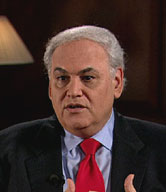 Richard Perle, A.K.A., “Prince of Darkness,” was the chairman of Defense Policy Board during the run-up to the Iraq war. He suggested Iraq had a hand in 9-11. In 1996, he authored “Clean Break,” a paper that was co-signed by Douglas Feith, David Wurmser, and others that argued for regime change in Iraq. Shortly after the war began, Perle resigned from the Board because he came under fire for having relationships with businesses that stood to profit from the war. Currently, Perle is a resident fellow at the American Enterprise Institute where he specializes in national security and defense issues. He has been investigated for ethical violations concerning war profiteering and other conflicts of interest.
Richard Perle, A.K.A., “Prince of Darkness,” was the chairman of Defense Policy Board during the run-up to the Iraq war. He suggested Iraq had a hand in 9-11. In 1996, he authored “Clean Break,” a paper that was co-signed by Douglas Feith, David Wurmser, and others that argued for regime change in Iraq. Shortly after the war began, Perle resigned from the Board because he came under fire for having relationships with businesses that stood to profit from the war. Currently, Perle is a resident fellow at the American Enterprise Institute where he specializes in national security and defense issues. He has been investigated for ethical violations concerning war profiteering and other conflicts of interest.In the New Statesman on December 16th, 2002 John Pilger, one of the most respected journalists in Britain, captured Perle's prophecy of Bush's grand idea:
This is total war. We are fighting a variety of enemies. There are lots of them out there. All this talk about first we are going to do Afghanistan, then we will do Iraq . . . this is entirely the wrong way to go about it. If we just Let our vision of the world go forth, and we embrace it entirely and we don't try to piece together clever diplomacy, but just wage a total war . . . our children will sing great songs about us years from now.In February 2003 when Operation Iraqi Freedom was less than a month away, he told David Rose,
Iraq is a very good candidate for democratic reform. It won't be Westminster overnight, but the great democracies of the world didn't achieve the full, rich structure of democratic governance overnight. The Iraqis have a decent chance of succeeding.Six months later, after Bush's 'mission' was 'accomplished', at in his address at the AEI Luncheon Keynote (Monday, September 22, 2003):
And a year from now, I’ll be very surprised if there is not some grand square in Baghdad that is named after President Bush. There is no doubt that, with the exception of a very small number of people close to a vicious regime, the people of Iraq have been liberated and they understand that they’ve been liberated. And it is getting easier every day for Iraqis to express that sense of liberation.Three years later, in October 2006, under the shadows of a looming Democratic election victory, Perle experienced bitter aftertaste in talking with David Rose:
The levels of brutality that we've seen are truly horrifying, and I have to say, I underestimated the depravity . . .
I think if I had been delphic, and had seen where we are today, and people had said, 'Should we go into Iraq?,' I think now I probably would have said, 'No, let's consider other strategies for dealing with the thing that concerns us most, which is Saddam supplying weapons of mass destruction to terrorists.'
. . . Could we have managed that threat by means other than a direct military intervention? Well, maybe we could have.

No comments:
Post a Comment